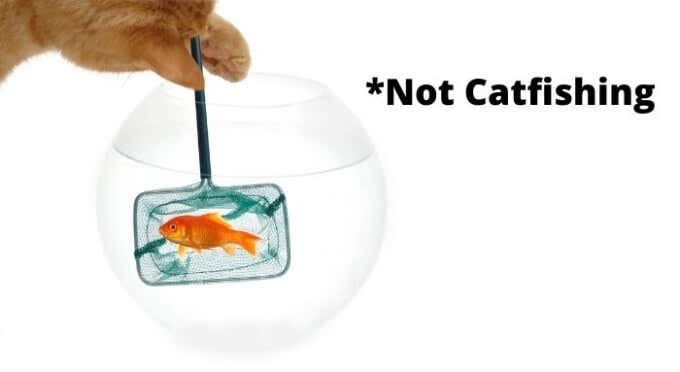Catfishing is a complex phenomenon that can be hard to spot. It’s a form of identity fraud where a person (or group of people) create a fake online persona and then target individuals, trying to start a (usually) romantic online relationship with them. The results of a catfishing scam can be devastating, but if you know the signs you could save yourself a lot of heartache.
What Is “Catfishing”?
It seems that the origin of the word “catfishing” to describe this unique type of internet fraud originally comes from a documentary titled Catfish. In that film, we see a young man who develops an online relationship with a woman on Facebook who turns out to be completely made up. The title came from a story told within the film describing how cod shipped in vats are kept active by pairing them with catfish. The analogy here is that the people who perpetrate catfishing keep us all on our toes. The term was then popularized by an MTV show titled Catfish: The TV Show. This was reality TV like Cheaters, where victims of catfishing confront their victimizers with the help of the show. That’s why we call it catfishing today.
What Happens During Catfishing?
While not always the case, it’s mostly the catfisher who makes the first move on the victim. They’ll usually receive a direct or private message with some sort of opener. “Hey there, handsome.” or “I can’t stop looking at your profile picture.” could be examples. Should the victim engage with them, the catfisher will start to weave their web. It’s not uncommon for catfishers to play the long game. The scam may be perpetrated over lengthy periods of time, building trust with the victim. Catfishers can be experts at manipulating and exploiting the personal weaknesses of the person they are targeting. Such as someone who is lonely, lost a spouse, or is otherwise vulnerable.
Why Does Catfishing Happen?
One of the trickier aspects of catfishing is that the people who do it can have many different motivations. The most straightforward one is money. There’s a thriving online catfishing industry that scams thousands of people out of their money each year. Then there’s catfishing as an act of pure and sadistic cyberbullying. The idea is to humiliate the victim and otherwise mentally torture them. Finally, the catfishing may not be intentionally malicious. Rather, some people use the anonymity the internet affords to create fictional personas that help them live out fantasies or explore their own romantic or sexual natures. For example, a married person may have a virtual fling with someone online while hiding behind a fake account they’ve created for that purpose. Despite the lack of malice in this type of catfishing, it’s no less devastating to the victim.
How to Spot a Catfishing Attempt?
Spotting a catfishing attempt can be incredibly tricky. First of all, not all warning signs apply to every type of catfisher. The motivations of the catfisher decides the type of attack on you. Nonetheless, there are some common things to look out for when your new online friend starts to make romantic overtures.
Fake Profile Pictures
One of the key tactics used by catfishers is stealing profiles from other people. Their profile picture could originate from anywhere. While it’s not 100% foolproof, a good way to detect fake profile pictures or other photos posted to their profile, is to use reverse image search. Have a look at What Reverse Image Search Is & How To Use It for a quick lesson on how to trace images back to their origin.
Complete Avoidance of Video Calls or Real-life Meetings
Since the catfisher probably doesn’t look like their profile picture, you’d expect they wouldn’t want to show their real face. Which is why you’ll also receive an excuse about why a video call or real-life meeting can’t happen. If the person is of a different gender to the fake account or has a completely different than expected accent, they may also say no to a voice call. If a catfisher is pushing for a serious relationship but won’t do something as simple as hop on Zoom to chat with you, that’s a big red flag.
Poor Language Skills
It’s not a universal sign of a scam, but you should be suspicious of someone who has poor spelling and grammar in their communication with you. Advanced catfishers can of course explain this away by creating a fake profile of someone who’s a second-language speaker.
They are Unrealistically Perfect
We don’t want to imply that you, dear reader, aren’t an absolute catch and couldn’t snag the person of your dreams. However, catfishers have a tendency to create fake profiles that are just a little too perfect. They may be beautiful, smart, qualified, skilled in every hobby and checking just about every other tick box you might have in mind for a partner. Ask yourself how realistic it is that such a person could exist and that they are obsessively targeting you for romance in particular.
They Have No Network of Friends
A catfisher’s fake profile can be well rounded with details about their fictional life, but it’s much harder to fake a real social network. Do they have any other friends? Are all their contacts suspiciously like fake accounts themselves? Do they interact with anyone else? Trust your gut and judge the account for how authentic it feels.
Sob Stories and Requests for Money
After establishing some measure of trust with you and making sure there’s some romantic interest, you’re likely to get a request for money. Usually there’s a “medical emergency” or the person claims they’re about to get evicted. Whatever the specifics, the need for money is urgent and your newfound affection is used as a way to get it without too much critical thinking involved on your part. Different catfishers have different styles of fleecing money from their victims. Some might escalate a single incident into ever larger sums as the “emergency” gets worse and worse before disappearing. Others might take small amounts of money over a long period of time, keeping up the scam for as long as possible. Just remember that not all catfishing incidents involve money. So just because this behavior doesn’t happen doesn’t mean you’re free and clear.
Where to Find Help if You’re a Victim
If you suspect that you’re being catfished, the most important thing to do is block the account. Don’t continue to communicate with the person and report their account to the social media platform. In some cases, you may also want to contact the police. These days many police forces have specialized units for crimes such as catfishing. They can help track down the real person and provide other forms of support. Especially if you’ve been scammed out of money. You should also take care to consider any psychological harm that may have been done to you. Check to see if there are any cyberbullying support organizations that you can contact for support and further information. Of course, you should also reach out to trusted friends and family members for support if you need to. Never be embarrassed that a catfisher fooled you. It really can happen to anyone!






